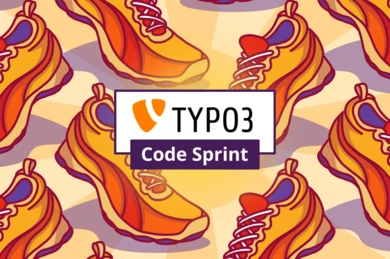
CMS Kickoff 2026 in Florida brought together agencies, CMS experts, and open source communities to discuss AI, digital sovereignty, and the future of content management systems from a global perspective.
Sharing what we've learned while delivering client projects online for more than 20 years and being leading contributors to TYPO3 is part of who we are.
We choose widely-adopted open-source technologies because we can fix, extend, and improve them while building on the experience and support of thousands of our peers. In our blog, we share with you the knowledge we've gained along the way for you to build on.
Read on!


CMS Kickoff 2026 in Florida brought together agencies, CMS experts, and open source communities to discuss AI, digital sovereignty, and the future of content management systems from a global perspective.

b13 is redesigning TYPO3’s backend for version 14 to feel modern, work faster, maintain user context, and create an expandable foundation that can evolve for years to come.

The Container Extension by Achim Fritz (b13) wins the TYPO3 Award 2025. A recognition for open source, clarity, and true TYPO3 DNA.

Five days, 14 contributors, countless ideas — and 55 patches created! Our team at b13 joined the TYPO3 v14 Feature Sprint in Geneva to push key improvements for backend UX, APIs, and media management.

TYPO3 is still an underdog in the UK. The first TYPO3 Camp in London demonstrated the powerful interplay between community, knowledge, and open source — and why visibility is the key to growth.

At CMS Connect 2025, the message was clear: AI is no threat - it’s a helpful tool. Insights on content strategy, search, governance, and content management.

In our previous blog post, we've touched on most elements of Content Security Policy (CSP) to mitigate any kind of injection via Cross-Site-Scripting. Now, let's dive into the practical part on how to make your TYPO3 site more secure by sending CSP Headers by default.

TYPO3 simplifies working with country lists by including a comprehensive Country API out-of-the-box, sourced from authoritative UN data. Say goodbye to third-party extensions and enjoy up-to-date, localized country lists in any language.

CMS Camp Mallorca 2024, held from September 26-29, gathered CMS experts for workshops, Barcamp sessions, and networking. It explored Headless CMS, AI, and CMS trends in a relaxed setting, fostering collaboration and learning.

TYPO3 is an open source CMS used widely across Europe, but it is still surprisingly little known in some regions. Built for international, multiregional, distributed, and multilingual organizations, TYPO3 is an accessible CMS for users around the world. In this article, we’ll walk you through the strengths of this CMS and why you should consider it alongside other popular solutions like Sitecore, Drupal, and WordPress.

While external teams will upgrade your ability to make updates and extend functionality for your customers, integrating them effectively is a challenge because code can quickly become opaque, buggy, and brittle. Our standard processes leverage automation, version control tools, virtualization, and standardized best practices to make sure everyone not only tugs on the same rope, but – crucially – in the same direction.

In an ever-evolving technological landscape, keeping your brand and technology up-to-date and competitive can feel like a full-time job. Whether you’re working on a website relaunch, a brand refresh, or a system-wide version update, it’s going to be time-consuming and expensive, not to mention repetitive. When your focus turns instead to future-proofing your website, you ensure your design and technology are ready for anything, now and for the long-term.

Enterprises now have many software delivery channel options to choose from. With software-as-a-service (SaaS) and cloud-based implementation models on the rise, you might be trying to figure out the best software delivery channel to support your enterprise’s digital strategy. If you don’t have an internal IT department, SaaS can be tempting, but when you also have stringent data compliance needs, an on-premises (or on-prem for short) solution is your best bet.

TYPO3’s separation of content and code is one of its major strengths. TYPO3 saves content in containers called content elements, which you can stack in content areas on a page record to create pages. The different parts of this highly configurable setup include “page types” (defined by the “doktype” field value in the pages database table record), a “backend layout” configuration, and possibly a third, separate “frontend layout” configuration value. We combine these components in various ways to enable different scenarios and desired outcomes.

TYPO3’s “Form” system extension is a flexible framework that can handle many configurations, templates, and use cases. While TYPO3 makes it easy to create forms on the fly, your business may have more complex needs that require backend adjustments. Rather than seeking tech help for every minor change, your company might benefit from a custom extension or flexible finisher that makes forms more self-serviceable for marketers. At b13, we love to help our clients get more flexibility out of TYPO3 Forms with custom solutions for specific business needs.

At b13, we’re often approached by CMOs and CEOs disgruntled by escalating costs. What seems like a relatively “cheap” CMS or software solution can often come with hidden or long-term expenses—like multiple relaunches, jumps in licensing fees, or pricey additions. As an agency committed to free and open source software like TYPO3, we’re dedicated to helping companies make forward-thinking decisions for their content strategy. In the process, we’ve identified some best practices for making smart, cost-effective decisions for your CMS.

One of TYPO3's powerful features for content publishing is Workspaces - creating and staging in a draft environment before publishing content. TYPO3 v11 adds a few important touches to this functionality, making it even more powerful - for both developers and editors.

TYPO3 version 11 supports keyboard navigation as suggested by the ARIA Authoring Practices. Users don’t need a mouse to navigate menus, trees, and to select multiple records. This work flows through to benefit all backend users, whether they’re solely relying on the keyboard, a screen reader or other assistive technologies.

Some organizations need multi-tree installations for their different translated content. We’re proposing an open source solution that you can be a part of.

b13 wouldn't exist without open-source software. Our leadership, technical expertise and commitment to life-long learning all stem from our deep roots in open source.

b13’s newest addition, Oli Bartsch, tells us how he got started in TYPO3 and about his Core contributions.

Meet our newest team member and bug-fixer-in-chief for TYPO3 Workspaces.

Workspaces are a killer feature in TYPO3 and we’re helping it reach its full potential. Find out how you can help or support us!